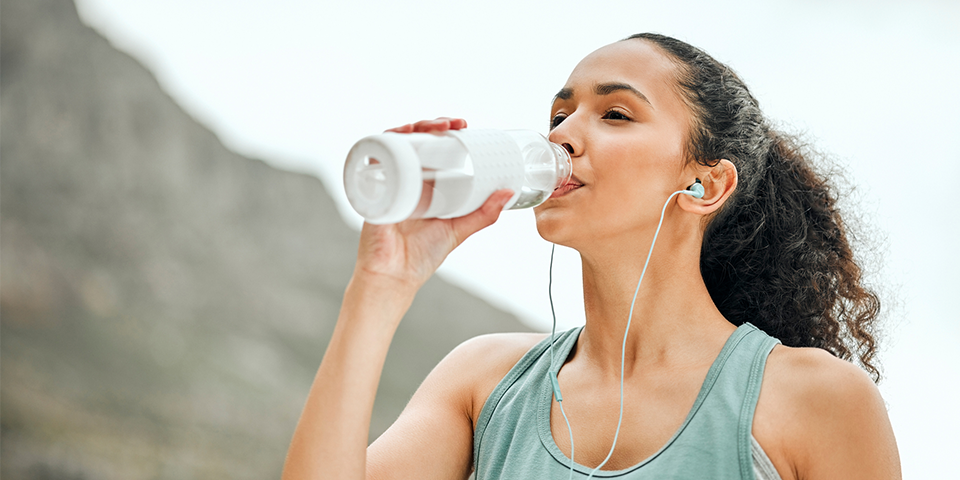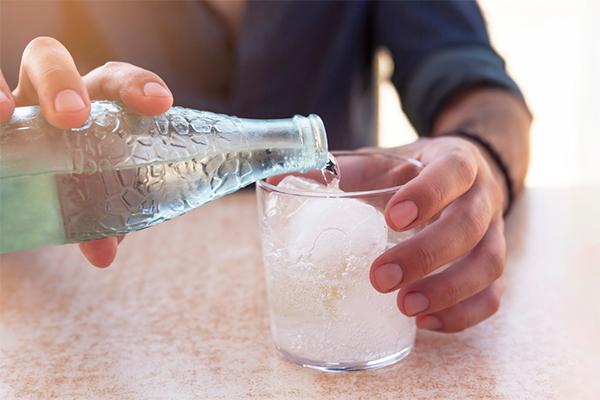Table of Contents
Hydrogen water has burst onto the scene in recent years with a slew of purported benefits and a ton of hype. When consumed in beverages, hydrogen shows promise and may support health in a variety of ways.
It also requires its consumers to fork over double what a bottle of water costs.
But does hydrogen consumption even benefit your health? Is it dangerous? Read on for answers.
What Is Hydrogen Water?
Hydrogen water is water with a boost of hydrogen gas.
Think of hydrogen water like carbonated water (water infused with carbon dioxide). Both infused elements are odorless, tasteless, and safe for consumption with a stamp of approval from the FDA.
However, there is currently no standard governing the amount of hydrogen companies may add to their pricey hydrogen beverages. And there isn’t enough science to support whether all this hydrogen consumption is OK in the long run.
“With all things new and improved, I recommend waiting out the hype phase while you spend time reading the research before investing your money on anything from cars and cell phones to dietary supplements,” says Barbie Tucker, RD, LD, M.Ed.
What Are the Potential Benefits of Hydrogen Water?
The hype around hydrogen water has some supporting science. Here are the purported benefits of this trendy tonic.
1. May help combat oxidative stress
Immune response, mental stress, and aging are just some of the ways our body reacts to stress by producing unstable molecules called free radicals, which can damage human tissue and contribute to an array of health concerns.
The primary benefits of hydrogen water come from its potential to combat this oxidative stress.
Exposure to environmental pollutants, heavy metals, cigarette smoke, alcohol, and radiation are just a few of the outside sources that cause free radical production.
2. May benefit aerobic function in athletes
A 2019 double-blind, placebo-controlled study found that while regular consumption of hydrogen water does not improve maximal exercise performance in young and healthy adults, participants did experience decreased heart rates before reaching maximum energy output.
This research is a promising development for athletes seeking to improve respiratory function (like for cyclers, swimmers, or runners).
3. May support normal cholesterol levels
An additional study of persons with metabolic syndrome who consumed nearly one liter of hydrogen-rich water per day saw significant reductions in LDL (“bad”) cholesterol and corresponding increases in HDL (“good”) cholesterol, along with reductions in levels of specific inflammatory markers.
Because this study included only 20 participants, further research with larger sample populations would help validate these findings. While we know some of the specific reactions of molecular hydrogen in the body, little is known about why these reactions occur.
Is Hydrogen Water Effective?
Research regarding hydrogen therapies is preliminary and primarily backed by a few encouraging studies in mice. While the outcomes of these studies are promising, they’re not completely understood.
Meanwhile, the few studies done on humans are small — often with fewer than 30 participants — and each outcome is mixed (proving we need more info on this hydrogen water fad).
“We will likely never have all of the answers, and even when we do, we find out later we were wrong (i.e., mesothelioma asbestos and Actos bladder cancer).
“So one must review the hype and the available scientific facts and then make the best decision for themselves at any given time,” Tucker says.
Should You Buy Hydrogen Water?
In 2014 the USDA declared hydrogen generally recognized as safe (GRAS) for consumption as an ingredient in drinking water, flavored beverages, and soda drinks at levels up to 2.14 percent by volume.
When you purchase hydrogen-infused water at the grocery store, opt for brands packaged in cans or aluminum-lined hydro packs and pouches, since hydrogen tends to leak through glass and plastic.
“Of course, there’s no need to spend that much money to reap the benefits of water. Instead, you can drink more water regularly and eat your fruit and veggies (void of pesticides, of course) because that’s a lot of antioxidant power, and it’s much cheaper,” Tucker says.
There also is little regulatory oversight in the consumer market and no standardized level of hydrogenation; it’s nearly impossible to be sure exactly how much hydrogen you are consuming.
With at-home hydrogen machines, the levels of infusion are vague, so hydrogen tablets offer the most control over how much hydrogen you receive in each beverage.
As a rule of thumb, it’s best to follow the FDA guidelines and limit your consumption of hydrogenated beverages.
While hydrogen water is not known to cause harm and is considered relatively safe, it is yet undetermined how much hydrogen must be consumed to derive any benefit, as well as amount that could present potential dangers.







More Stories
The One Thing You Should Never, Ever Do if You Have Insulin Resistance and Want to Lose Weight
Tuna Salad Lunch Box – JSHealth
Advanced Wellness Course – Heart Health